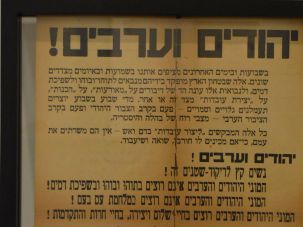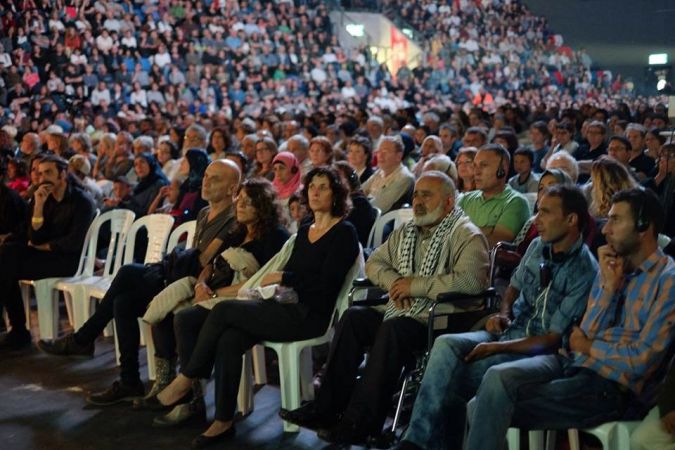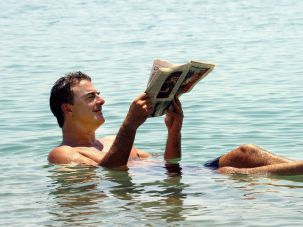Organizzazioni israeliane e palestinesi ricordano insieme la Nakba e la fondazione di Israele
Sintesi personale
Vorremmo ringraziare le migliaia di persone che hanno partecipato all' undicesimo ° MEMORIAL ISRAELO-Palestinese,. Ci ha dato forza vedere questa enorme folla che dimostra il desiderio di riconciliazione .
Grazie a tutti coloro che hanno sostenuto e continuano a sostenere il nostro percorso che come abbiamo visto, ancora una volta ieri, è il percorso di migliaia di persone palestinesi e israeliane convinte che la guerra non sia predestinata e che si possa porre fine al Ciclo della violenza.
Per le donazioni vai a: http://bit.ly/22igCQL
La registrazione è qui live.cfpeace.com (guardando 00:47 min)
Parents Circle-Families Forum
We would like to thank the thousands who attended the 11th Israeli-Palestinian Memorial Day Ceremony yesterday. We drew great strength from seeing the huge crowd that came and proved that especially this year, out of the greatest pain still comes the desire for reconciliation and the aspiration for another way.
Vorremmo ringraziare le migliaia di persone che hanno partecipato all' undicesimo ° MEMORIAL ISRAELO-Palestinese,. Ci ha dato forza vedere questa enorme folla che dimostra il desiderio di riconciliazione .
Grazie a tutti coloro che hanno sostenuto e continuano a sostenere il nostro percorso che come abbiamo visto, ancora una volta ieri, è il percorso di migliaia di persone palestinesi e israeliane convinte che la guerra non sia predestinata e che si possa porre fine al Ciclo della violenza.
Per le donazioni vai a: http://bit.ly/22igCQL
La registrazione è qui live.cfpeace.com (guardando 00:47 min)
Parents Circle-Families Forum
We would like to thank the thousands who attended the 11th Israeli-Palestinian Memorial Day Ceremony yesterday. We drew great strength from seeing the huge crowd that came and proved that especially this year, out of the greatest pain still comes the desire for reconciliation and the aspiration for another way.
Thank you to all of
those who supported and continue to support our path, which as we saw
once again yesterday, is the path of thousands on both sides - the
Israeli and Palestinian - who believe that War is not predestined and
that we can end the cycle of violence.
Many people volunteered so that this important event could take place again this year, and we continue our effort to cover the evening’s costs. To donate, please go to: http://bit.ly/22igCQL
We apologize for the mishaps during the live streaming online. We are working on uploading the ceremony in full and parts of it to Facebook and our site. Until then, you are welcome to watch a recording of the ceremony in an initial quality at live.cfpeace.com (staring at 00:47 min)
Parents Circle-Families Forum
2
Many people volunteered so that this important event could take place again this year, and we continue our effort to cover the evening’s costs. To donate, please go to: http://bit.ly/22igCQL
We apologize for the mishaps during the live streaming online. We are working on uploading the ceremony in full and parts of it to Facebook and our site. Until then, you are welcome to watch a recording of the ceremony in an initial quality at live.cfpeace.com (staring at 00:47 min)
Parents Circle-Families Forum
2
Parents Circle-Families Forum ha condiviso il post di Gili Getz.
Gili Getz
Very moving ceremony and conversation last night at the NIF for Yom HaZikaron (Memorial Day). We remembered victims of war and terror with Parents Circle-Families Forum, a joint Israeli and Palestinian organization of families who have lost a close family member as a result of the conflict. After watching the ceremony from Israel Elik Elhanan, who lost his sister when a suicide bomber blew himself up, and is the co-founder of Combatants for Peace (a group of former fighters engaging in nonviolent struggle for peace and reconciliation between Palestinians and Israelis), lit a candle and talked about solidarity and working for co-existence. We also red Yehuda Amichai's poem "The Place Where We Are Right"
Photo from Israel by Tatyana Gitlits
2
Very moving ceremony and conversation last night at the NIF for Yom HaZikaron (Memorial Day). We remembered victims of war and terror with Parents Circle-Families Forum, a joint Israeli and Palestinian organization of families who have lost a close family member as a result of the conflict. After watching the ceremony from Israel Elik Elhanan, who lost his sister when a suicide bomber blew himself up, and is the co-founder of Combatants for Peace (a group of former fighters engaging in nonviolent struggle for peace and reconciliation between Palestinians and Israelis), lit a candle and talked about solidarity and working for co-existence. We also red Yehuda Amichai's poem "The Place Where We Are Right"
Photo from Israel by Tatyana Gitlits
2
Eetta Prince-Gibson spent Yom Hazikaron with 3,000 Israelis — and hundreds of Palestinians from the West Bank.
forward.com
This time of year is always hard for me. In Israel, we move quickly
from Passover to Holocaust Memorial Day; a week later, we mark the
Memorial Day for Fallen Soldiers and Victims of Terror; a day later we
celebrate Independence Day. We go from attending solemn ceremonies as
the sirens blare to attending joyful barbecues as the military parades
pass. These set rituals are meant to give meaning to us as a society,
framing Israel’s official narrative: from slavery to freedom, from
victimhood to victory.
I still believe that there is deep historical and mythic truth to this narrative. But like all official narratives, it’s incomplete. It teaches us to see the Jewish people, and Israel as the expression of the people, as the world’s ultimate victim, doomed to live by the sword. Then what? More war until the Messiah comes? Army and death forever? When my children were born, I, like every other Israeli parent, hoped they wouldn’t have to serve in the army. Now, they’ve already completed their army service, and I’m starting to wonder about my not-even-born-yet grandchildren.
That’s why, when it comes time to decide which commemorative ceremony to attend, I hesitate as I take stock of my options.
First there are the official ceremonies, filled with real and forced pathos, where political officials buck up the national narrative. Wave the flag in support of the Jewish people’s right to self-determination, they say, while they deny the right of others to the same nationhood. Pay homage to heroes who died in wars, the politicos demand, as they shirk their responsibility for making peace. Stay with the tribe, they tell us, because everyone from every other tribe wants to kill us all. They want me to deny that I am afraid for my children and myself, because fear, they warn, is weakness. They encourage us to support the army, because it protects our borders, and they hope we don’t think too much about protecting democracy, justice or equality. They caution me not to recognize a Palestinian mother’s pain, because that is a denial of a Jewish mother’s pain. They tell me to love my country for how just and right and good it is.
Then there are the “alternative” ceremonies, conducted by various far-left groups. They, too, make demands. Suspend emotion and wrap yourself in intellectualized cynicism, the organizers say. Turn your back on the flag and denounce Jewish nationalism, they insist, while they assert the right of the Palestinians to the same nationhood. Stay with this tribe, they warn, because the other tribe is dragging us toward fascism. Deny that you are afraid for your children and yourself, because Palestinian violence is merely a result of the occupation. Denounce the army, because there is no need to protect our borders or ourselves. Do not give credence to Jewish pain, because then you are denying Palestinian pain. Unlove your country, because there is nothing good here anymore.
Each of these options offers singular Truths, but my life is made up of multiple truths. Each demands that I give up part of what I feel, but I want to hold on to all my feelings — fear and pride, delight and deep sadness, wonder and anger, gratitude and rage — even if they’re contradictory. Not one of these ceremonies creates a space where I can both celebrate Israeli independence and recognize that it created the Palestinians’ Nakba or “Catastrophe.”
So this year, for the first time, I decided to attend the Israeli-Palestinian Memorial Ceremony. Sponsored by the Combatants for Peace Movement in cooperation with the Parents’ Circle - Bereaved Families Forum, the ceremony was established by a bereaved parent, Buma Inbar, whose son, Yotam, a fighter in the Golani Brigade, was killed in Lebanon in 1995.
I sat with some 3,000 Israelis, plus hundreds of Palestinians from the West Bank (who received special permits from the Israeli security authorities to attend the ceremony). I listened to Neta Shemesh, a mother of three and grandmother of two, who lost her mother when terrorists infiltrated her kibbutz in 1974, and lost her brother in the first Lebanon War. I heard the words of Adan al-Masri, a mother of eight from Nablus, whose son Wassam was shot in the head during violent demonstrations at Joseph’s Tomb in September 1996. I watched as Yigal Elhannan, who lost his sister Smadar in a terrorist attack in downtown Jerusalem in September 1997, embraced Arab Aramin, whose sister Abir died from a rubber bullet fired by a border patrol officer while she was walking home from school.
There was music and dance, and a search for new art forms for complex expression. As the organizers promised, the ceremony demonstrated, however briefly, the possibility of peace not based on indifference to pain, but rather with a direct reference to loss and bereavement on both sides. “The only revenge for the death of Abir and Smadar is peace,” Arab and Yigal said.
This ceremony has been held for 11 years, and each year more people participate. But I have always steered clear of it. Now that I was finally here, I wondered what’d taken me so long. After all, I’ve been involved in peace and dialogue groups for years. I’ve been active in a joint Palestinian-Israeli group that’s drawing up plans for sustainable solutions to the conflict in Jerusalem. I’ve shared my hopes and fears with Palestinians. But I wasn’t willing to share pain.
Sitting at this ceremony, I suddenly understood that collective pain can also be, paradoxically, a comfort zone. The pain is raw, and leaves little room for criticism or thought or questions. If we hurt enough, we may not have to ask how we were wounded in the first place. And that scared me.
And yet, by taking the risk and attending this ceremony at last, I made a commitment: to remember and to hope, to feel the pain and to look to the future, to celebrate Independence Day while recalling the Nakba and trying to build a better society. To mourn the dead, but never to value them more than the living.
Eetta Prince-Gibson, the former editor in chief of The Jerusalem Report, is an award-winning journalist who lives in Jerusalem.
I still believe that there is deep historical and mythic truth to this narrative. But like all official narratives, it’s incomplete. It teaches us to see the Jewish people, and Israel as the expression of the people, as the world’s ultimate victim, doomed to live by the sword. Then what? More war until the Messiah comes? Army and death forever? When my children were born, I, like every other Israeli parent, hoped they wouldn’t have to serve in the army. Now, they’ve already completed their army service, and I’m starting to wonder about my not-even-born-yet grandchildren.
That’s why, when it comes time to decide which commemorative ceremony to attend, I hesitate as I take stock of my options.
First there are the official ceremonies, filled with real and forced pathos, where political officials buck up the national narrative. Wave the flag in support of the Jewish people’s right to self-determination, they say, while they deny the right of others to the same nationhood. Pay homage to heroes who died in wars, the politicos demand, as they shirk their responsibility for making peace. Stay with the tribe, they tell us, because everyone from every other tribe wants to kill us all. They want me to deny that I am afraid for my children and myself, because fear, they warn, is weakness. They encourage us to support the army, because it protects our borders, and they hope we don’t think too much about protecting democracy, justice or equality. They caution me not to recognize a Palestinian mother’s pain, because that is a denial of a Jewish mother’s pain. They tell me to love my country for how just and right and good it is.
Then there are the “alternative” ceremonies, conducted by various far-left groups. They, too, make demands. Suspend emotion and wrap yourself in intellectualized cynicism, the organizers say. Turn your back on the flag and denounce Jewish nationalism, they insist, while they assert the right of the Palestinians to the same nationhood. Stay with this tribe, they warn, because the other tribe is dragging us toward fascism. Deny that you are afraid for your children and yourself, because Palestinian violence is merely a result of the occupation. Denounce the army, because there is no need to protect our borders or ourselves. Do not give credence to Jewish pain, because then you are denying Palestinian pain. Unlove your country, because there is nothing good here anymore.
Each of these options offers singular Truths, but my life is made up of multiple truths. Each demands that I give up part of what I feel, but I want to hold on to all my feelings — fear and pride, delight and deep sadness, wonder and anger, gratitude and rage — even if they’re contradictory. Not one of these ceremonies creates a space where I can both celebrate Israeli independence and recognize that it created the Palestinians’ Nakba or “Catastrophe.”
So this year, for the first time, I decided to attend the Israeli-Palestinian Memorial Ceremony. Sponsored by the Combatants for Peace Movement in cooperation with the Parents’ Circle - Bereaved Families Forum, the ceremony was established by a bereaved parent, Buma Inbar, whose son, Yotam, a fighter in the Golani Brigade, was killed in Lebanon in 1995.
I sat with some 3,000 Israelis, plus hundreds of Palestinians from the West Bank (who received special permits from the Israeli security authorities to attend the ceremony). I listened to Neta Shemesh, a mother of three and grandmother of two, who lost her mother when terrorists infiltrated her kibbutz in 1974, and lost her brother in the first Lebanon War. I heard the words of Adan al-Masri, a mother of eight from Nablus, whose son Wassam was shot in the head during violent demonstrations at Joseph’s Tomb in September 1996. I watched as Yigal Elhannan, who lost his sister Smadar in a terrorist attack in downtown Jerusalem in September 1997, embraced Arab Aramin, whose sister Abir died from a rubber bullet fired by a border patrol officer while she was walking home from school.
There was music and dance, and a search for new art forms for complex expression. As the organizers promised, the ceremony demonstrated, however briefly, the possibility of peace not based on indifference to pain, but rather with a direct reference to loss and bereavement on both sides. “The only revenge for the death of Abir and Smadar is peace,” Arab and Yigal said.
This ceremony has been held for 11 years, and each year more people participate. But I have always steered clear of it. Now that I was finally here, I wondered what’d taken me so long. After all, I’ve been involved in peace and dialogue groups for years. I’ve been active in a joint Palestinian-Israeli group that’s drawing up plans for sustainable solutions to the conflict in Jerusalem. I’ve shared my hopes and fears with Palestinians. But I wasn’t willing to share pain.
Sitting at this ceremony, I suddenly understood that collective pain can also be, paradoxically, a comfort zone. The pain is raw, and leaves little room for criticism or thought or questions. If we hurt enough, we may not have to ask how we were wounded in the first place. And that scared me.
And yet, by taking the risk and attending this ceremony at last, I made a commitment: to remember and to hope, to feel the pain and to look to the future, to celebrate Independence Day while recalling the Nakba and trying to build a better society. To mourn the dead, but never to value them more than the living.
Eetta Prince-Gibson, the former editor in chief of The Jerusalem Report, is an award-winning journalist who lives in Jerusalem.






Commenti
Posta un commento